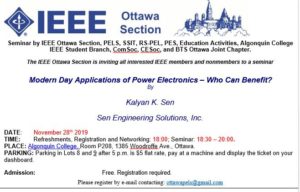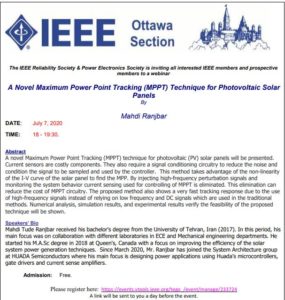Events
IEEE YP Ottawa Section: Introduction to Amateur Radio Certification
Introduction to Amateur Radio Certification
Presenters: Mike Kennedy and Anis Ben Arfi
This workshop covers the basics of Amateur Radio including:
- How to obtain your license
- Demonstrations
- Hands on!
- Ready to get on the air?
Date: Wednesday, November 27th, 2019 (5:00 – 7:00 PM)
Location: Carleton University, Tory Building Room: 230!
Snacks and refreshments provided!
For more information, visit the following:
https://events.vtools.ieee.org/m/210526
https://www.facebook.com/events/3009020362459225/
https://twitter.com/IEEEYPOttawa/status/1195910737136431106?s=20
https://site.ieee.org/ottawa-yp/event/workshop-introduction-to-amateur-radio-certification/

Seminar by IEEE Ottawa Section, PELS, SSIT, RS-PEL, PES, Education Activities, Algonquin College IEEE Student Branch, ComSoc, CESoc, and BTS Ottawa Joint Chapter.
The IEEE Ottawa Section is inviting all interested IEEE members and nonmembers to a seminar
Modern Day Applications of Power Electronics – Who Can Benefit?
ByÂ
Kalyan K. Sen
Sen Engineering Solutions, Inc.
DATE:
November 28th 2019
TIME:
Refreshments, Registration and Networking: 18:00;
Seminar: 18:30 – 20:00.
PLACE:
Algonquin College, Room P208, 1385 Woodroffe Ave., Ottawa.
PARKING:
Parking in Lots 8 and 9 after 5 p.m. is $5 flat rate, pay at a
machine and display the ticket on your dashboard.
ADMISSION:
Free. Registration required.
Please register by e-mail contacting: ottawapels@gmail.com
Abstract:
Application of power electronics is widespread in everyday life. Some applications are considered as “nice to have it;†in other cases, they are essential. This presentation discusses a wide variety of daily-used applications around the world. Also covered is an advanced topic, such as SMART Controller that today’s grid requires for voltage regulation, power factor regulation, unbalance voltage/current regulation, harmonic elimination and so on. A SMART Controller that is based on functional requirements and cost-effective solutions is derived from utilizing the best features of all the technical concepts that are developed until now. Final year students of electrical engineering undergraduate curriculum, post graduate students, researchers, academicians and utility engineers will benefit from attending this course. The participantswill hear from an expert who actually designed and commissioned a fewutility-grade SMART controllers since their inception in the 1990s.
Modern Day Applications of Power Electronics – Who Can Benefit
![[CANCELLED] IEEE Ottawa seminar on Microgrid Stability Definitions, Analysis, and Modeling @ Algonquin College, T-Building, Room T129 | Ottawa | Ontario | Canada](https://www.ieeeottawa.ca/wp-content/uploads/2020/02/IEEE_MFarrokhabadi_Seminar_Flyer_17Mar2020-232x300.jpg)
NOTE: This event has been cancelled due to COVID-19 precautions
Dear colleagues,
Due to the current situation regarding corrona virus COVID-19, we have to CANCEL our IEEE Ottawa Section Seminar:
“Microgrid Stability Definitions, Analysis, and Modeling”
by Dr. Mostafa Farrokhabadi,
which was scheduled for Tuesday, Mar. 17, 2020, 6:00 p.m., at Algonquin College, 1385 Woodroffe Ave., T-Building, Room T129.
The new date and time for this seminar will be determined and announced when the circumstances allow.
We are sorry for the inconvenience and thank you for your understanding.
Sincerely,
Branislav Djokic
TITLE: Microgrid Stability Definitions, Analysis, and Modeling
SPEAKER: Dr. Mostafa Farrokhabadi, Director of Technology at BluWave-ai, Ottawa
DATE: Â Â Â Tuesday, March 17, 2020.
TIME:    Refreshments, Registration and Networking: 6:00 p.m.; Seminar: 6:30 p.m. – 7:30 p.m.
LOCATION: Ciena Optophotonics Lab, Room T129, T-Building, School of Advanced Technology, Algonquin College, 1385 Woodroffe Ave., Ottawa, ON Canada K2G 1V8.
PARKING: Parking at Lots 8 and 9 after 5 p.m. is $5 flat rate, pay at a machine and display the ticket on your dashboard. Please respect restricted areas.
Abstract: A microgrid is defined as a group of Distributed Energy Resources (DERs) and loads that act locally as a single controllable entity and can operate in both grid-connected and islanded modes. Microgrids are considered a critical link in the evolution from vertically integrated bulk power systems to smart decentralized networks, by facilitating the integration of DERs. Entities, such as government agencies, utilities, military bases, and universities around the world are deploying microgrids, and an increasing number of these systems are expected to be developed in the next decade. In general, stability in microgrids has been treated from the perspective of conventional bulk power systems. However, the nature of the stability problem and dynamic performance of a microgrid are considerably different than those of a conventional power system due to intrinsic differences between microgrids and bulk power systems, such as size, feeder types, high share of Renewable Energy Sources (RES), converter-interfaced components, low inertia, measurement devices such as Phase-Locked Loop (PLL), unbalanced operation, etc.
This seminar discusses the findings of the award-winning IEEE PES Task Force on Microgrid Stability Definitions, Analysis, and Modeling, which defines concepts and identifies relevant issues related to stability in microgrids. The seminar presents definitions and classification of microgrid stability, considering pertinent microgrid features such as voltage-frequency dependence, unbalancing, low inertia, and generation intermittency. A few examples will be also presented, highlighting some of the stability classes discussed during the seminar.
Speaker’s Bio: Dr. Mostafa Farrokhabadi is the Senior Director of Technology at BluWave-ai, an internationally award-winning startup offering AI-enabled control and optimization solutions for smart grids. He has more than 8 years of experience in designing mission critical grid solutions for industry and academia, including technical leadership of a $6M international consortium in Electric Grid Modernization, and Smart Grid projects with Hatch and Canadian Solar. Mostafa has authored/co-authored several high-impact technical papers and patents on intelligent control and optimization of renewable-penetrated grids.
Mostafa obtained his PhD in Electrical and Computer Engineering from the University of Waterloo. He has also studied and performed research in Sweden at KTH and Germany at KIT. During the course of his career, Mostafa has received multiple business, research, and teaching awards, including the prestigious University of Waterloo Doctoral Thesis Completion Award and Ottawa’s Forty Under 40.
Mostafa has also led the award-winning IEEE Power and Energy Society Task Force on microgrid stability, an international coalition of 21 researchers from 14 institutions investigating stability issues in microgrids. Currently, he serves as an Associate Editor of the IEEE Transactions on Smart Grid.
Admission: Free. Registration required. Please register by e-mail contacting: ajit.pardasani@ieee.org or branislav@ieee.org.
IEEE_MFarrokhabadi_Seminar_Flyer_17Mar2020

In this time of social distancing, we are pleased to announce that all the team members of IEEE YP and WIE Ottawa Sections are fully committed to providing online interaction and support to our community! In partnership with Professional Engineers Ontario, we present an online talk in “Clarifying the Path to Becoming a Professional Engineer.”
If you are an engineering undergraduate or post-graduate student, or a recent graduate starting out your engineering career, then this seminar might be for you. In it you will learn:
- What is PEO?
- What engineering experience is PEO looking for once I graduate?
- I have international engineering education and experience; how is that evaluated by PEO?
- How is my engineering experience evaluated by PEO?
- How do I prepare my Experience Record?
- What is the PPE?
- What is the EIT Program and the Student Membership Program?
The emphasis of this webinar will be on the P. Eng. licensure process – what PEO is looking for. The webinar will focus on how engineering experience is evaluated and how you can facilitate the process. Learn the dos and don’ts of preparing your licensing application for evaluation.
To participate, you will require: internet connection to view the webinar, phone access to dial into the conference for audio.
We look forward to speaking with you!

|
The IEEE Reliability Society & Power Electronics  A Novel Maximum Power Point Tracking (MPPT) Technique for Photovoltaic Solar Panels By  Mahdi Ranjbar DATE:      July 7, 2020 TIME:       18 – 19:30.     A  Mahdi
A link will be sent to you a day before the event. Â |

